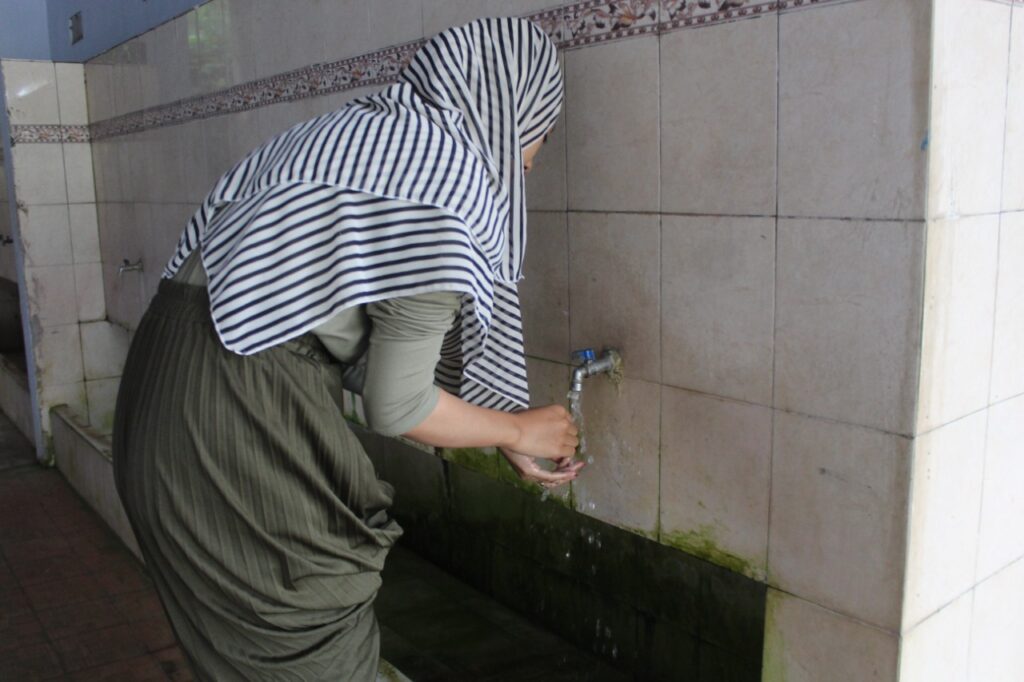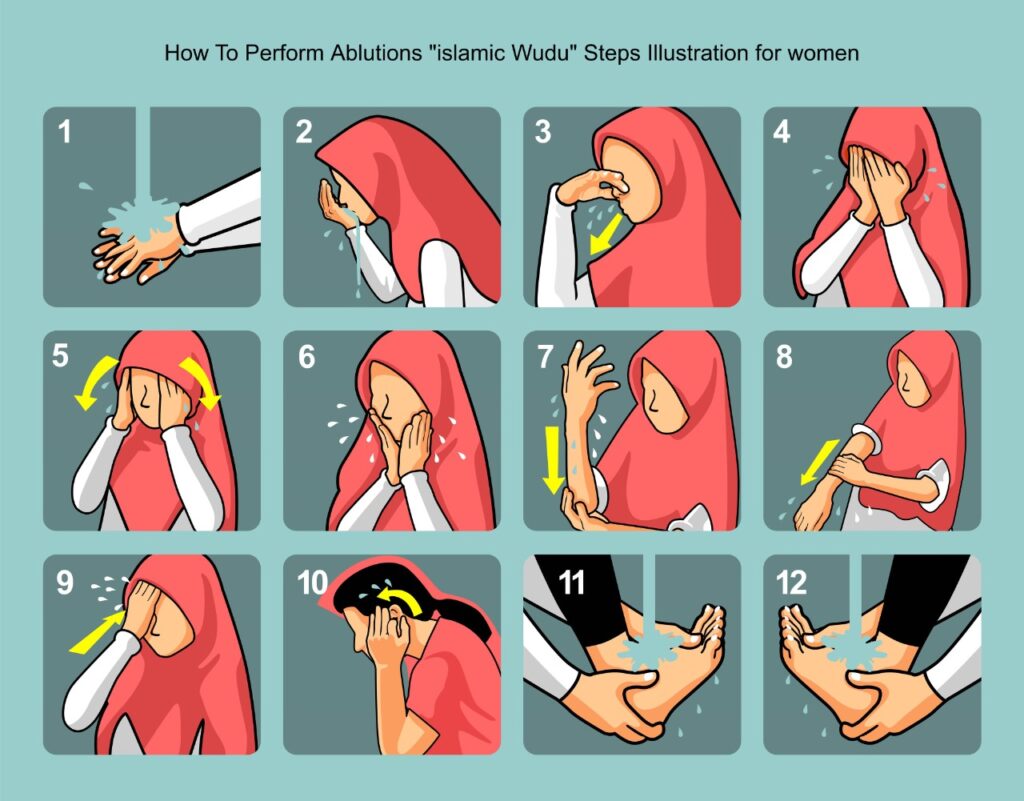

Wudu (وضوء in Arabic) is an Arabic word that means the purification of certain parts of the body clarified in the Quran and it’s a mandatory part, which salah isn’t completed without it.
In this article, you’ll know the importance of wudu, how to make it perfectly according to Quran and sunnah, and what breaks wudu besides other answers to the most frequent questions that might pop up in your mind.

Every Muslim must perform Wudu before offering Salah. This act of worship purifies the body and soul from all traces of impurity and makes one ready to perform Salah and communicate with Allah.
Wudu also has other benefits and blessings on the religious and spiritual dimensions of the human such as purifying the heart, strengthening one’s conviction in Islamic beliefs, and atoning for one’s sins. Also, it makes the Muslim happy, light-hearted, and tranquil. And you can hear many Muslims say that Wudu is a strength for the Muslim and fortitude for his heart.
If you’re interested in learning more about quality Islamic education that teaches proper Wudu techniques and other essential practices, read our guide on The Real Cost of Online Quran Classes: What You’re Actually Paying For to understand how to find the right instructor for your needs.
‘Uthman reported God’s messenger as saying, “If anyone performs the ablution well, his sins will come out from his body, even coming out from under his nails.”
(Bukhari and Muslim.)
Another hadith confirmed this same meaning
`Uthman narrated that: I heard the Prophet (ﷺ) say: `Whoever does wudu and does it well, then goes in and prays, his sins between that prayer and the next will be forgiven until he prays [the second prayer].”(Bukhari and Muslim.)
Besides its religious and spiritual benefits, much scientific research has proved its tremendous impact on health and hygiene. In the Wudu process, all passages exposed to germs in the surrounding environment are well-washed five times a day, thus, they become fortified against germs and bacterial infections that proliferate in the non-cleaned areas.
Wadu is important for offering prayer to Allah and it’s a required/ mandatory ritual as a hadith by Prophet Mohammed said
“Narrated AbuHurayrah:
The Messenger of Allah (ﷺ) said: The prayer of a person who does not perform ablution is not valid, and the ablution of a person who does not mention the name of Allah (in the beginning) is not valid.
Wadu, for women, achieves bodily and spiritual purification. Body purifications are related to obvious dirt and impurities and spiritual purification is associated with sins and immoral acts.
Wudu steps should be in the following order
According to most Muslim scholars, the intention is considered a condition for right ablution, except the Hanafi school said it is not required. However, every good act in Islam should be preceded by pure intention, which shouldn’t necessarily be said by tongue but by evoking Allah in your heart and then saying bismillah.
After intention, You should wash your palms three times
According to Quran, this step isn’t wajib as Allah said
O you who believe! When you stand (intend) to offer the Salah (the prayer), then wash your faces and your hands (forearms) up to the elbows, rub (by passing wet hands over) your heads, and (wash) your feet up to the ankles. If you are in a state of Janaba, purify yourselves (bathe your whole body).
So, In Quran, it’s clear to start by washing the face. However, it’s a sunna of the prophet to follow this step as a hadith said
It was narrated from (Aws bin) Abi Aws that his grandfather said:
“I saw the Messenger of Allah (ﷺ) trickle water into his hand until it started to drip from his hand, three times.”

Take a handful of water in your hand, cup it into your mouth, swirl it around three times, and take it out.
Like the mouth, take a handful of water and inhale it to purify your nose of any dirt or mucus. Rinse it three times.
Splash water around your face from the top point of your forefront ( hairline) to your chin three times.
Important: Wasing face isn’t sunna like the previous steps but mandatory since it’s mentioned explicitly in the Quran
For men who have a thick, entangled beard, it’s desirable if they pass a wetted hand through their beard
It’s a required step mentioned in Quran. rinse your forearms From wrist to elbow, leaving no part day. Start by your right forearm three times, then switch to the left arm and do it three times each.
it’s a required condition for wudu (and it’s called masah). for men, they wet their hands with water and pass it through the locks of their hair fully from front to rear. But for females, it will be hard to do that as they have long hair and can be tied, so they are allowed to wash the front of their heads.
Also, when they’re out, and it’s hard for them to put their scarf aside, they can either wet only three locks of the front of their hair or pass water on their scarf as a hadith of the proper Mohammed allowed that
Muslim scholars dispute whether it’s a sunna or wajib. Most Muslim scholars see it’s sunna of the prophet and they found evidence that the prophet Mohammed was sometimes not washing his ears. Imam Al Hanbali and some who follow Malikz doctrine see it’s required as the ear is a part of the head and Allah ordered Muslims to wash their head fully.
Clean up each of your feet three times from toes to the ankles and be sure water goes between your toes, using your finger to scrub them completely and scrub off any sloppy specks of dirt.

Read also: Moharram and Ashura: How Do People Celebrate This Month?
After explaining the steps of wudu, we want to warn you about all the things that can break it or make it invalid, so be aware of it.
It refers to any kind of dirt ( najas) and impurity that comes out of the private parts like farting, urine, excrement, sperms, and if prayer isn’t valid except in some cases like a man/woman that can’t control the flow of urine and in this case, the patient should perform wudu before each salah
حَدَّثَنِي إِسْحَاقُ، حَدَّثَنَا عَبْدُ الرَّزَّاقِ، عَنْ مَعْمَرٍ، عَنْ هَمَّامٍ، عَنْ أَبِي هُرَيْرَةَ، عَنِ النَّبِيِّ صلى الله عليه وسلم قَالَ “ لاَ يَقْبَلُ اللَّهُ صَلاَةَ أَحَدِكُمْ إِذَا أَحْدَثَ حَتَّى يَتَوَضَّأَ ”.
Narrated Abu Huraira:
The Prophet (ﷺ) said, “Allah does not accept the prayer of any one of you if he does Hadath (passes wind) till he performs the ablution (anew).
If a Muslim makes wudu, then sleeps and wakes up, he should repeat his wudu.
Like being in a coma, madness, having drugs, seizures, and anything that leads to being unconscious
Allah said in Quran:
يا أيها الذين آمنوا لا تقربوا الصلاة وأنتم سكارى [ حتى تعلموا ما تقولون ]
O, believers! Do not approach prayer while intoxicated1 until you are aware of what you say
Imam ibn Hanbal and Abu Hanifa see that bleeding spoils wudu and they concluded that from a hadith by Prophet Mohammed, saying
وَعَنْ عَائِشَةَ رَضِيَ اَللَّهُ عَنْهَا; أَنَّ رَسُولَ اَللَّهِ صَلَّى عَلَيْهِ وَسَلَّمَ قَالَ: { مَنْ أَصَابَهُ قَيْءٌ أَوْ رُعَافٌ, أَوْ قَلَسٌ, أَوْ مَذْيٌ فَلْيَنْصَرِفْ فَلْيَتَوَضَّأْ, ثُمَّ لِيَبْنِ عَلَى صَلَاتِهِ, وَهُوَ فِي ذَلِكَ لَا يَتَكَلَّمُ } أَخْرَجَهُ اِبْنُ مَاجَ ه 1 .
Narrated ‘Aisha (rad):
Allah’s Messenger (ﷺ) said: “Whoever vomits, bleeds through the nose, or released Madhi (urethral discharge) should go, perform ablution and then complete his Salat (prayer) (by continuing from where he had stopped at) on condition that he does not speak in the process”. Reported by Ibn Majah
عَنْ أَبِي أَيُّوبَ، قَالَ سَمِعْتُ رَسُولَ اللَّهِ ـ صلى الله عليه وسلم ـ يَقُولُ “ مَنْ مَسَّ فَرْجَهُ فَلْيَتَوَضَّأْ ” .
It was narrated that Abu Ayyub said:
“I heard the Messenger of Allah say: ‘Whoever touches his sexual organ, let him perform ablution.'”
Madhi is a white, thick liquid discharged when thinking of sexual lust or seeing something sexy, and one of its signs is that lust isn’t scratched by its discharging and its required wudu. While sperm ( منى in Arabic) is discharged in fully sexual intercourse that might lead to fertilization, requiring ghusl.

Read also: 7 Authentic Signs of Laylatul Qadr You Must Know
for Haid women, they should do Ghusl after the stop of menstruation.
عَنْ عَائِشَةَ، أَنَّ فَاطِمَةَ بِنْتَ أَبِي حُبَيْشٍ، كَانَتْ تُسْتَحَاضُ فَسَأَلَتِ النَّبِيَّ صلى الله عليه وسلم فَقَالَ “ ذَلِكِ عِرْقٌ، وَلَيْسَتْ بِالْحَيْضَةِ، فَإِذَا أَقْبَلَتِ الْحَيْضَةُ فَدَعِي الصَّلاَةَ، وَإِذَا أَدْبَرَتْ فَاغْتَسِلِي وَصَلِّي ”.
Narrated `Aisha:
Fatima bint Abi Hubaish used to have bleeding in between the periods, so she asked the Prophet (ﷺ) about it. He replied, “The bleeding is from a blood vessel and not the menses. So give up the prayers when the (real) menses begins, and when it has finished, take a bath and start praying.”
There’re two types of Ghusl, and you can do each one.
In which the Muslims just do what’s required without sunna. The female women make the intention for purification and washing all of her body with water as if plunging into a water pool
It’s the sunna of the prophet Mohammed
The Muslim female intends purification and washes her hands three times, then washes her vagina, then makes wudu as he is preparing herself for salah then washes her head three times so water seeps into her hair pores. then starts washing her right part and then left water until the water reaches all parts of her body.
Hadith of Ghasal
حَدَّثَنَا يَحْيَى بْنُ يَحْيَى التَّمِيمِيُّ، حَدَّثَنَا أَبُو مُعَاوِيَةَ، عَنْ هِشَامِ بْنِ عُرْوَةَ، عَنْ أَبِيهِ، عَنْ عَائِشَةَ، قَالَتْ كَانَ رَسُولُ اللَّهِ صلى الله عليه وسلم إِذَا اغْتَسَلَ مِنَ الْجَنَابَةِ يَبْدَأُ فَيَغْسِلُ يَدَيْهِ ثُمَّ يُفْرِغُ بِيَمِينِهِ عَلَى شِمَالِهِ فَيَغْسِلُ فَرْجَهُ ثُمَّ يَتَوَضَّأُ وُضُوءَهُ لِلصَّلاَةِ ثُمَّ يَأْخُذُ الْمَاءَ فَيُدْخِلُ أَصَابِعَهُ فِي أُصُولِ الشَّعْرِ حَتَّى إِذَا رَأَى أَنْ قَدِ اسْتَبْرَأَ حَفَنَ عَلَى رَأْسِهِ ثَلاَثَ حَفَنَاتٍ ثُمَّ أَفَاضَ عَلَى سَائِرِ جَسَدِهِ ثُمَّ غَسَلَ رِجْلَيْهِ .
‘A’isha reported:
When Allah’s Messenger (ﷺ) bathed because of sexual intercourse, he first washed his hands: he then poured water with his right hand on his left hand and washed his private parts. He then performed ablution as is done for prayer’. He then took some water, put his fingers, and moved them through the roots of his hair. And when he found that these had been properly moistened, then poured three handfuls on his head and then poured water over his body and subsequently washed his feet.
Wudu is a purification for the body and soul, and it’s an integral part that any prayer can’t be completed without it. Also, it has significant benefits for your spiritual and physical health.
In this article, you’ve learned much about wudu with evidence from the Quran and sunna. I hope this will make you perfect your wudu and get the satisfaction of Allah.
Love it? Share it with your connection on social media so they can benefit too.

